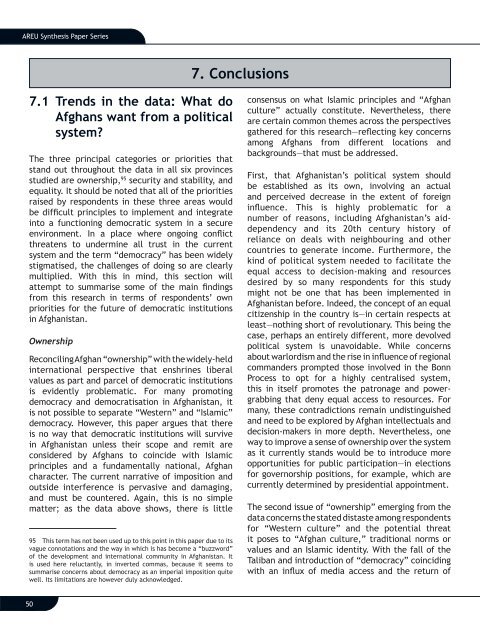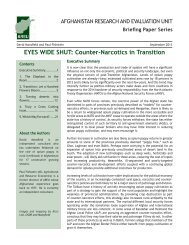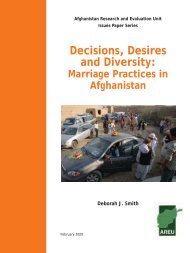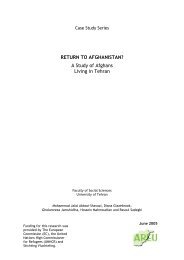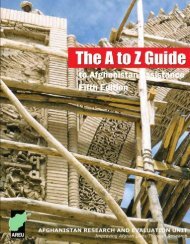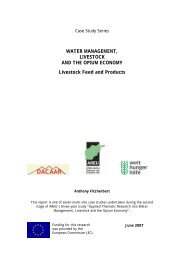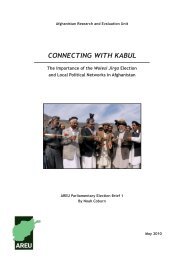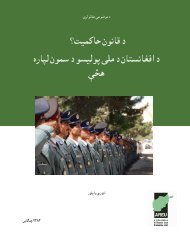“Democracy” in Afghanistan - the Afghanistan Research and ...
“Democracy” in Afghanistan - the Afghanistan Research and ...
“Democracy” in Afghanistan - the Afghanistan Research and ...
You also want an ePaper? Increase the reach of your titles
YUMPU automatically turns print PDFs into web optimized ePapers that Google loves.
AREU Syn<strong>the</strong>sis Paper Series<br />
7. Conclusions<br />
7.1 Trends <strong>in</strong> <strong>the</strong> data: What do<br />
Afghans want from a political<br />
system?<br />
The three pr<strong>in</strong>cipal categories or priorities that<br />
st<strong>and</strong> out throughout <strong>the</strong> data <strong>in</strong> all six prov<strong>in</strong>ces<br />
studied are ownership, 95 security <strong>and</strong> stability, <strong>and</strong><br />
equality. It should be noted that all of <strong>the</strong> priorities<br />
raised by respondents <strong>in</strong> <strong>the</strong>se three areas would<br />
be difficult pr<strong>in</strong>ciples to implement <strong>and</strong> <strong>in</strong>tegrate<br />
<strong>in</strong>to a function<strong>in</strong>g democratic system <strong>in</strong> a secure<br />
environment. In a place where ongo<strong>in</strong>g conflict<br />
threatens to underm<strong>in</strong>e all trust <strong>in</strong> <strong>the</strong> current<br />
system <strong>and</strong> <strong>the</strong> term “democracy” has been widely<br />
stigmatised, <strong>the</strong> challenges of do<strong>in</strong>g so are clearly<br />
multiplied. With this <strong>in</strong> m<strong>in</strong>d, this section will<br />
attempt to summarise some of <strong>the</strong> ma<strong>in</strong> f<strong>in</strong>d<strong>in</strong>gs<br />
from this research <strong>in</strong> terms of respondents’ own<br />
priorities for <strong>the</strong> future of democratic <strong>in</strong>stitutions<br />
<strong>in</strong> <strong>Afghanistan</strong>.<br />
Ownership<br />
Reconcil<strong>in</strong>g Afghan “ownership” with <strong>the</strong> widely-held<br />
<strong>in</strong>ternational perspective that enshr<strong>in</strong>es liberal<br />
values as part <strong>and</strong> parcel of democratic <strong>in</strong>stitutions<br />
is evidently problematic. For many promot<strong>in</strong>g<br />
democracy <strong>and</strong> democratisation <strong>in</strong> <strong>Afghanistan</strong>, it<br />
is not possible to separate “Western” <strong>and</strong> “Islamic”<br />
democracy. However, this paper argues that <strong>the</strong>re<br />
is no way that democratic <strong>in</strong>stitutions will survive<br />
<strong>in</strong> <strong>Afghanistan</strong> unless <strong>the</strong>ir scope <strong>and</strong> remit are<br />
considered by Afghans to co<strong>in</strong>cide with Islamic<br />
pr<strong>in</strong>ciples <strong>and</strong> a fundamentally national, Afghan<br />
character. The current narrative of imposition <strong>and</strong><br />
outside <strong>in</strong>terference is pervasive <strong>and</strong> damag<strong>in</strong>g,<br />
<strong>and</strong> must be countered. Aga<strong>in</strong>, this is no simple<br />
matter; as <strong>the</strong> data above shows, <strong>the</strong>re is little<br />
95 This term has not been used up to this po<strong>in</strong>t <strong>in</strong> this paper due to its<br />
vague connotations <strong>and</strong> <strong>the</strong> way <strong>in</strong> which is has become a “buzzword”<br />
of <strong>the</strong> development <strong>and</strong> <strong>in</strong>ternational community <strong>in</strong> <strong>Afghanistan</strong>. It<br />
is used here reluctantly, <strong>in</strong> <strong>in</strong>verted commas, because it seems to<br />
summarise concerns about democracy as an imperial imposition quite<br />
well. Its limitations are however duly acknowledged.<br />
consensus on what Islamic pr<strong>in</strong>ciples <strong>and</strong> “Afghan<br />
culture” actually constitute. Never<strong>the</strong>less, <strong>the</strong>re<br />
are certa<strong>in</strong> common <strong>the</strong>mes across <strong>the</strong> perspectives<br />
ga<strong>the</strong>red for this research—reflect<strong>in</strong>g key concerns<br />
among Afghans from different locations <strong>and</strong><br />
backgrounds—that must be addressed.<br />
First, that <strong>Afghanistan</strong>’s political system should<br />
be established as its own, <strong>in</strong>volv<strong>in</strong>g an actual<br />
<strong>and</strong> perceived decrease <strong>in</strong> <strong>the</strong> extent of foreign<br />
<strong>in</strong>fluence. This is highly problematic for a<br />
number of reasons, <strong>in</strong>clud<strong>in</strong>g <strong>Afghanistan</strong>’s aiddependency<br />
<strong>and</strong> its 20th century history of<br />
reliance on deals with neighbour<strong>in</strong>g <strong>and</strong> o<strong>the</strong>r<br />
countries to generate <strong>in</strong>come. Fur<strong>the</strong>rmore, <strong>the</strong><br />
k<strong>in</strong>d of political system needed to facilitate <strong>the</strong><br />
equal access to decision-mak<strong>in</strong>g <strong>and</strong> resources<br />
desired by so many respondents for this study<br />
might not be one that has been implemented <strong>in</strong><br />
<strong>Afghanistan</strong> before. Indeed, <strong>the</strong> concept of an equal<br />
citizenship <strong>in</strong> <strong>the</strong> country is—<strong>in</strong> certa<strong>in</strong> respects at<br />
least—noth<strong>in</strong>g short of revolutionary. This be<strong>in</strong>g <strong>the</strong><br />
case, perhaps an entirely different, more devolved<br />
political system is unavoidable. While concerns<br />
about warlordism <strong>and</strong> <strong>the</strong> rise <strong>in</strong> <strong>in</strong>fluence of regional<br />
comm<strong>and</strong>ers prompted those <strong>in</strong>volved <strong>in</strong> <strong>the</strong> Bonn<br />
Process to opt for a highly centralised system,<br />
this <strong>in</strong> itself promotes <strong>the</strong> patronage <strong>and</strong> powergrabb<strong>in</strong>g<br />
that deny equal access to resources. For<br />
many, <strong>the</strong>se contradictions rema<strong>in</strong> undist<strong>in</strong>guished<br />
<strong>and</strong> need to be explored by Afghan <strong>in</strong>tellectuals <strong>and</strong><br />
decision-makers <strong>in</strong> more depth. Never<strong>the</strong>less, one<br />
way to improve a sense of ownership over <strong>the</strong> system<br />
as it currently st<strong>and</strong>s would be to <strong>in</strong>troduce more<br />
opportunities for public participation—<strong>in</strong> elections<br />
for governorship positions, for example, which are<br />
currently determ<strong>in</strong>ed by presidential appo<strong>in</strong>tment.<br />
The second issue of “ownership” emerg<strong>in</strong>g from <strong>the</strong><br />
data concerns <strong>the</strong> stated distaste among respondents<br />
for “Western culture” <strong>and</strong> <strong>the</strong> potential threat<br />
it poses to “Afghan culture,” traditional norms or<br />
values <strong>and</strong> an Islamic identity. With <strong>the</strong> fall of <strong>the</strong><br />
Taliban <strong>and</strong> <strong>in</strong>troduction of “democracy” co<strong>in</strong>cid<strong>in</strong>g<br />
with an <strong>in</strong>flux of media access <strong>and</strong> <strong>the</strong> return of<br />
50


